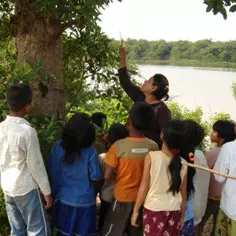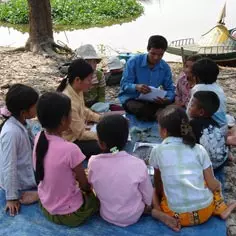
Environment and Biodiversity
Project leader
Osmose
Place
Lac Tonlé Sap, Cambodia
Sponsor
Sophie Ducoloner
Grant(s)
20,000 euro to the Selection Committee at 2006/07/04
The NGO Osmose, which enjoys an excellent reputation, has set itself targets that are totally relevant to promoting the sustainable development of a naturally rich but poorly conserved region. The Foundation’s grant focused on environmental education, employment and equipment finance will help boost the leverage effect of the activities financed by Osmose.”
Sophie Ducoloner
At times of high water in the Mekong, caused a phenomenon that is unique in the world, the flow in the stream that links the river to Tonle Sap Lake is reversed, and the Mekong flows into the lake. Its surface area is multiplied fivefold, creating a natural environment of flooded forests, a privileged nesting zone for numerous species of birds, some of which are highly sought after. Until recently, poaching provided an additional, and for some the only source of income for the local villages along the lakeshore, creating a threat for the species concerned.
Since 1999, the Osmose association has focused on linking the conservation of this exceptional site with local economic development, notably by capitalizing on its tourism potential.
The effectiveness of a multi-dimensional project
Osmose has retrained twenty-five villagers, including several former poachers, as forest guards. Twenty other families have been given boats and now take tourists on guided tours through this bird life sanctuary. The creation of 48 floating market gardens, the reintroduction of the ancestral crop of water hyacinths and the establishment a craft industry based on its byproducts provide additional food and income for the villagers.

The creation of nature awareness classes for 1,200 children, hygiene classes and free medical consultations, in partnership with the Angkor Children's Hospital, the supply of water filters... the Osmose association provides global development aid, which it now wants to step up a notch. The Foundation's support along with that of other partners, including the UNDP and the Asian Development Bank, will in particular enable it to increase the frequency of its medical rounds, train health workers in the villages, increase the number of water filters and provide schooling for an additional one hundred children. Research is also underway on replacing the ageing boats used to ferry the tourists with ecological boats that are based on a unique concept.

